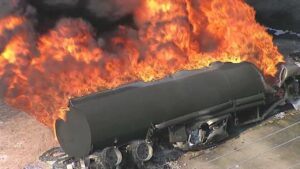
Tragedy on the Kano-Hadejia Expressway
A catastrophic petrol tanker explosion in Jigawa State has claimed the lives of at least 94 people, with over 50 critically injured in a harrowing incident that has left the region in mourning. The accident occurred late last night at around 11:40 pm on the Kano-Hadejia expressway when a tanker carrying petrol overturned, causing panic and chaos in the surrounding area. The tragic explosion happened as residents rushed to scoop up fuel from the overturned truck, unaware of the looming danger.
The Accident: A Chain of Events Leading to Disaster
According to eyewitnesses and initial reports from authorities, the driver of the petrol tanker lost control while navigating the busy expressway, which is notorious for its hazardous road conditions. The tanker flipped over, spilling its volatile cargo across the road and into nearby fields. As news of the overturned tanker spread, locals rushed to the scene with containers to collect the leaking petrol, unaware of the impending catastrophe.
The explosion, described by one witness as “like a bomb going off,” occurred as the crowd gathered to scoop fuel. A survivor, visibly shaken, recounted the moments before the explosion: “We heard a loud bang, and everything went up in flames. People were screaming and running, but there was nowhere to go.”
Casualties and Response: A Community Devastated
The aftermath of the explosion has left the community in shock. Emergency services arrived swiftly at the scene, but the sheer scale of the fire made it difficult to control. Many of the victims were trapped in the flames, unable to escape the inferno that engulfed the area. The bodies of the dead, many of them burnt beyond recognition, were taken to local hospitals, where officials are struggling to cope with the influx of casualties.
A local health worker, speaking to the press, confirmed that the death toll could rise as several critically injured victims remain in intensive care. “We are doing everything we can, but many of those injured have suffered severe burns. The next 48 hours will be crucial,” she stated.
Risky Fuel Scooping: A Repeated Tragedy
This is not the first time that such an incident has occurred in Nigeria. Fuel scooping from overturned tankers is a common, yet dangerous practice, especially in rural areas where poverty is rampant and fuel is a valuable commodity. Despite repeated warnings from authorities about the dangers of approaching overturned tankers, many people continue to risk their lives for the chance to collect free fuel.
“These kinds of accidents are a tragic reminder of the desperation many Nigerians face daily,” said a government official from Jigawa, calling for stronger enforcement of safety protocols and public awareness campaigns to prevent future tragedies. The Nigerian National Petroleum Corporation (NNPC) has also expressed condolences and reiterated its long-standing advice against such perilous actions, warning of the volatility of fuel in these circumstances.
Reactions and Calls for Reform
The explosion has sparked outrage and calls for action from various quarters. Humanitarian organizations have pointed out that such accidents are preventable, and the death toll reflects the broader issues of inadequate infrastructure and public safety education in Nigeria. “We must not only mourn the dead but also take immediate steps to improve road safety standards and educate our people on the dangers of fuel scooping,” said a representative from a local NGO advocating for road safety reforms.
Moreover, questions have been raised about the condition of the roads and the regulatory oversight of fuel transport in the country. The Kano-Hadejia expressway, where the accident occurred, is known for its poor maintenance and frequent accidents, making it a high-risk area for heavy-duty vehicles.
A Heartbreaking Loss and a Moment for Change
As the community grapples with the loss of so many lives, the tragic events of last night serve as a stark reminder of the precarious conditions many Nigerians face. The survivors, families of the deceased, and the entire Jigawa region are left in mourning, while the country as a whole reflects on the need for change.
The Jigawa tanker explosion is yet another tragedy in a series of similar accidents that have plagued the nation. The government, in collaboration with relevant agencies, must take urgent steps to ensure that fuel transportation is handled with the utmost care and that communities are better informed of the dangers associated with fuel scooping.
This catastrophe underscores the importance of robust infrastructure, stringent safety measures, and public awareness. As Nigeria continues to develop, preventing such tragedies must remain at the forefront of national policy discussions.
Conclusion: A Call for Reflection and Action
The Jigawa petrol tanker explosion is a heart-wrenching reminder of the dangers that come with infrastructural challenges and economic desperation. It is a call for both immediate action and long-term reform to prevent future incidents of this magnitude. While the nation mourns, there is an urgent need to ensure that these deaths are not in vain and that steps are taken to improve road safety, enforce regulations, and raise public awareness about the risks involved in fuel scooping.
This tragedy demands reflection and accountability—on behalf of both the authorities and the communities involved. The lives lost in Jigawa should catalyze the much-needed reforms to save others from meeting the same fate.
